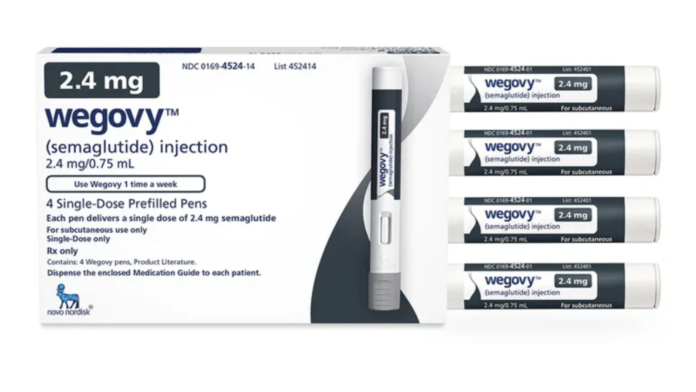Drugs that treat obesity and overweight are improving their efficacy. They are also increasingly being prescribed by doctors and covered by insurers – a win for patients and for investors. “While supply is still a top concern for Wegovy, we’ve been impressed with commercial formulary access for obesity,” Geoff Meacham, an analyst at Bank of America, wrote in a research note, published Wednesday. According to Novo Nordisk , the maker of weight-loss drug Wegovy, about 80% of anti-obesity medications are being covered by health insurers, Meacham said. Novo’s semaglutide is branded Wegovy as a weight-loss treatment and Ozempic for the treatment of type 2 diabetes. The drug is centered on the incretin hormone glucagon-like peptide-1, or GLP-1, receptor agonists, and it helps regulate insulin in the body and slow gastric emptying to make patients feel full. The hormone also travels to the brain, binding with receptors on neurons in the hypothalamus to suppress appetite. When combined with lifestyle modifications, patients taking Wegovy can sustain a 15% weight loss , according to late-stage clinical trial data. Wegovy was approved by the FDA last year, but has been plagued by supply constraints since its launch. Demand for the drug as a weight-loss treatment has not only boosted its sales, but also those of Ozempic and of Novo Nordisk’s older medication, Saxenda, or liraglutide, as patients look to access treatment. Eli Lilly has a competing drug, Mounjaro, that uses both GLP-1 and a second incretin, glucose-dependent insulinotropic polypeptide, or GIP. Mounjaro, or tirzepatide, has been approved to treat type 2 diabetes since the spring, and a review of its use for obesity was fast-tracked by the Food and Drug Administration in early October. In the first part of Lilly’s phase-three clinical trial, patients lost between 16% and 22.5% of their body weight while taking the medication. That pace is significant because it is close to the results patients achieve from bariatric surgery. Reimbursement overhang Still, both of these drugs have steep price tags, which makes it necessary for patients to have the support of their insurance providers in order to make treatment affordable. Without insurance, Wegovy can cost about $1,350 or more per month, while Mounjaro has a list price of $974.33. “Indeed, obesity reimbursement has been an overhang in the space (especially as we look to a potential tirzepatide launch in 2H23), but with two large players pushing for access, our [key opinion leaders] continue to be optimistic on the commercial opportunity,” Meacham said. Meacham expects Mounjaro will have an edge over Wegovy once it receives FDA approval for obesity treatment since it has shown the ability to aid greater weight loss. He has predicted that Mounjaro sales will reach $100 billion a year by 2035 if approved to treat obesity and several other illnesses for which it is being tested. However, at the moment, Novo ended the third quarter with at 56% share of the GLP-1 market, up 1% from the second quarter. The recent third-quarter earnings reports from the two companies showed that more doctors are prescribing the GLP-1 medications for both diabetes and obesity. Also, both drugs helped their respective companies outpace analysts’ earnings and revenue estimates in the third quarter, Meacham said. However, the upside from the products has been limited by supply constraints, which the companies are working to resolve. Novo said it should be able to meet the projected demand for Wegovy by the end of the year. Eli Lilly shares have gained about 30% since January. Meacham has a $390 price target for the stock, which implies upside of more than 9% from its closing level on Wednesday. Shares of Novo Nordisk, which Meacham doesn’t cover, are up roughly 2% this year. AGA lends its support Although not referenced in Meacham’s research note, weight-loss drugs also received a boost from new guidance issued Tuesday by the American Gastroenterological Association that recommends people with obesity take prescription weight-loss medication in addition to making changes to diet and exercise. The recommendation mentioned both Novo’s Wegovy and Saxenda as well as older treatments, Qysmia and Contrave. Obesity is a growing health issue in the U.S. that can contribute to a number of other maladies including heart disease and certain kinds of cancer. According to the Centers for Disease Control, more than 40% of American adults had obesity in 2019 to 2020 . That was up from about 30.5% of the U.S. population in 2000 to 2009.
© heardonwallstreet.com


